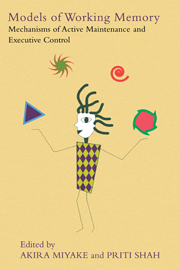Book contents
- Frontmatter
- Contents
- List of Contributors
- Dedication
- Preface
- Ode on Working Memory
- Acknowledgments
- 1 Models of Working Memory: An Introduction
- 2 Working Memory: The Multiple-Component Model
- 3 An Embedded-Processes Model of Working Memory
- 4 Individual Differences in Working Memory Capacity and What They Tell Us About Controlled Attention, General Fluid Intelligence, and Functions of the Prefrontal Cortex
- 5 Modeling Working Memory in a Unified Architecture: An ACT-R Perspective
- 6 Insights into Working Memory from the Perspective of the EPIC Architecture for Modeling Skilled Perceptual-Motor and Cognitive Human Performance
- 7 The Soar Cognitive Architecture and Human Working Memory
- 8 Long-Term Working Memory as an Alternative to Capacity Models of Working Memory in Everyday Skilled Performance
- 9 Interacting Cognitive Subsystems: Modeling Working Memory Phenomena Within a Multiprocessor Architecture
- 10 Working Memory in a Multilevel Hybrid Connectionist Control Architecture (CAP2)
- 11 A Biologically Based Computational Model of Working Memory
- 12 Models of Working Memory: Eight Questions and Some General Issues
- 13 Toward Unified Theories of Working Memory: Emerging General Consensus, Unresolved Theoretical Issues, and Future Research Directions
- Name Index
- Subject Index
Preface
Published online by Cambridge University Press: 05 June 2012
- Frontmatter
- Contents
- List of Contributors
- Dedication
- Preface
- Ode on Working Memory
- Acknowledgments
- 1 Models of Working Memory: An Introduction
- 2 Working Memory: The Multiple-Component Model
- 3 An Embedded-Processes Model of Working Memory
- 4 Individual Differences in Working Memory Capacity and What They Tell Us About Controlled Attention, General Fluid Intelligence, and Functions of the Prefrontal Cortex
- 5 Modeling Working Memory in a Unified Architecture: An ACT-R Perspective
- 6 Insights into Working Memory from the Perspective of the EPIC Architecture for Modeling Skilled Perceptual-Motor and Cognitive Human Performance
- 7 The Soar Cognitive Architecture and Human Working Memory
- 8 Long-Term Working Memory as an Alternative to Capacity Models of Working Memory in Everyday Skilled Performance
- 9 Interacting Cognitive Subsystems: Modeling Working Memory Phenomena Within a Multiprocessor Architecture
- 10 Working Memory in a Multilevel Hybrid Connectionist Control Architecture (CAP2)
- 11 A Biologically Based Computational Model of Working Memory
- 12 Models of Working Memory: Eight Questions and Some General Issues
- 13 Toward Unified Theories of Working Memory: Emerging General Consensus, Unresolved Theoretical Issues, and Future Research Directions
- Name Index
- Subject Index
Summary
Without doubt, working memory is one of the “hottest” topics in cognitive psychology and cognitive neuroscience. Since the publication of Baddeley's (1986) landmark book, several monographs and edited volumes that explore various aspects of working memory have been published (e.g., Gathertole, 1996; Gathercole & Baddeley, 1993; Logie, 1995; Logie & Gilhooly, 1998; Richardson, Engle, Hasher, Logie, Stoltzfus, & Zacks, 1996; Vallar & Shallice, 1990). Also, at least four journals have published a special issue on this topic (International Journal of Behavioral Development, 1994; see also de Ribaupierre & Hitch, 1994; Memory & Cognition, 1993; Neuropsychology, 1994; Quarterly Journal of Experimental Psychology, 1996), and another is also planning to publish a special section in 2000 (Journal of Experimental Psychology: General). In July of 1994 – 20 years after the publication of the seminal article on working memory that defined the field (Baddeley & Hitch, 1974) – an international conference specifically dedicated to working memory was held in Cambridge, UK, bringing together more than 200 researchers from across the world.
Working memory is also one of the most intensively studied areas in a new emerging field of study, cognitive neuroscience. Reflecting the dramatic surge of interest in neuroimaging studies of working memory, two general science magazines (Science and Scientific American) recently published articles that report the state of the art of research inquiry into the neural basis of working memory (Beardsley, 1997; Wickelgren, 1997).
Information
- Type
- Chapter
- Information
- Models of Working MemoryMechanisms of Active Maintenance and Executive Control, pp. xiii - xviiPublisher: Cambridge University PressPrint publication year: 1999
Accessibility standard: Unknown
Why this information is here
This section outlines the accessibility features of this content - including support for screen readers, full keyboard navigation and high-contrast display options. This may not be relevant for you.Accessibility Information
- 1
- Cited by
